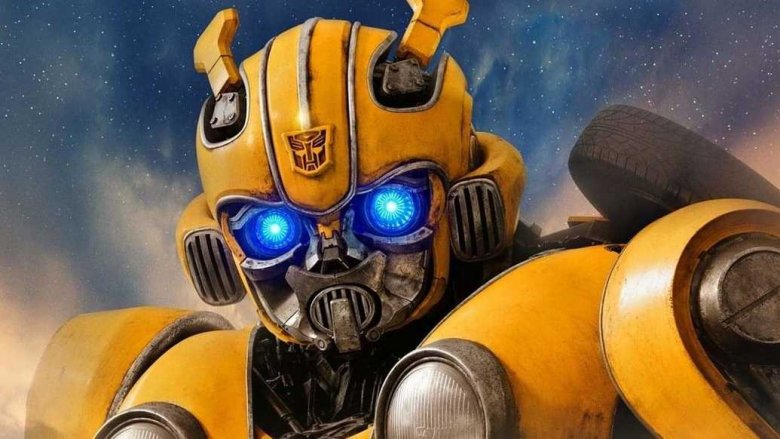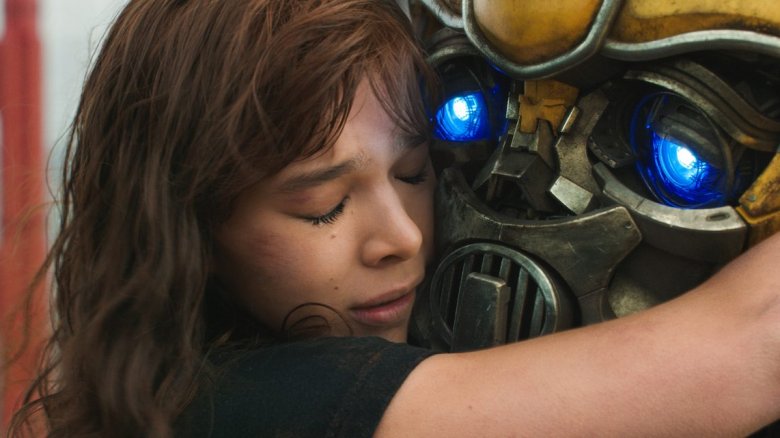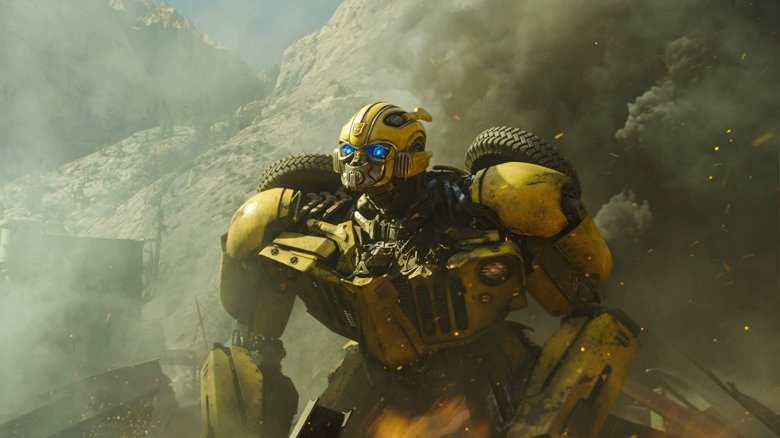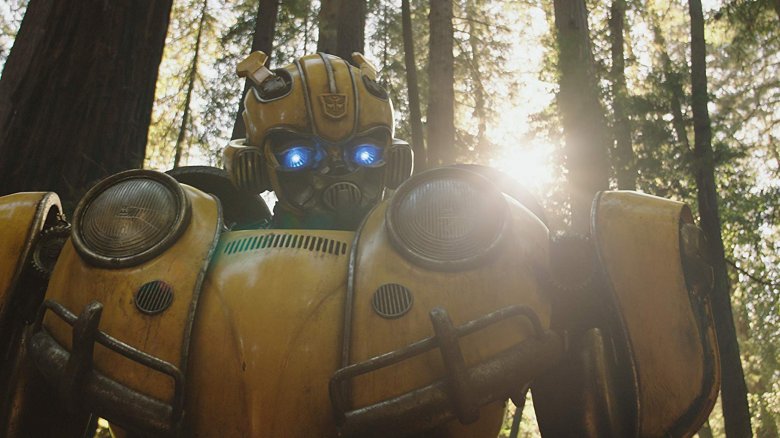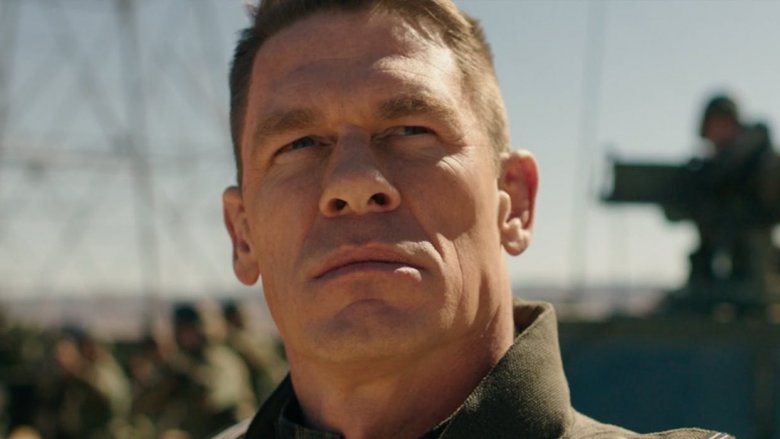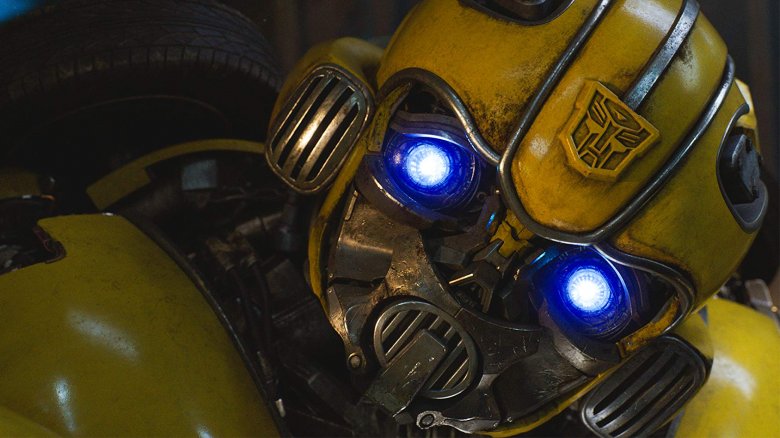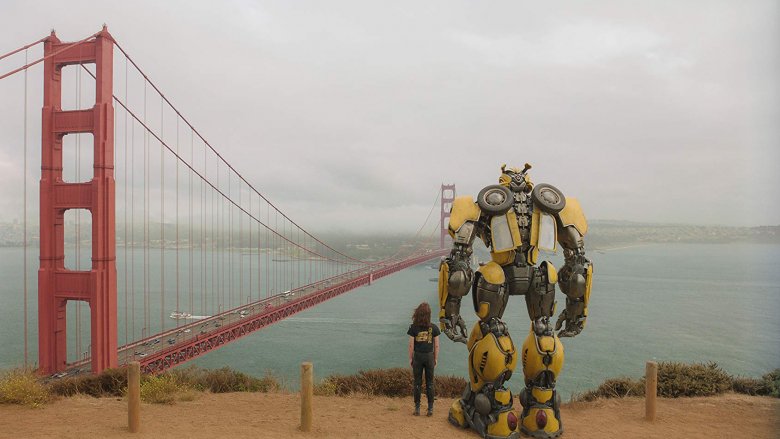The Ending Of Bumblebee Explained
Bumblebee has buzzed into theaters, bringing moviegoers a brand new kind of Transformers film — one focused more on its protagonists than on screen-shaking action sequences. This origin story introduces the shy but strong titular Autobot (voiced in the first few minutes by Dylan O'Brien) and the spunky 18-year-old Charlie (Hailee Steinfeld), who discovers him in the scrapyard she frequents while trying to restore her late father's convertible.
Director Travis Knight and screenwriter Christina Hodson have spun the franchise into softer but still incredibly satisfying territory with Bumblebee, the first live-action Transformers film not directed by Michael Bay, and their decisions have paid off big time. Critics and fans alike are cheering Bumblebee as engaging, charming, "undoubtedly energetic, infectiously witty," and possibly the best Transformers movie in the entire franchise.
In making a film that offers nostalgia for the 1980s and the Transformers animated series, Knight and Hodson crafted a prequel that entertains from start to end. And what an ending it had! Another subversion from the Transformers norm, Bumblebee wrapped up not on a cliffhanger, but with a closed chapter for Charlie, what could be a new beginning for Bee, and the potential for the franchise to follow along the fresh path it paves.
There's a lot to take in, even for longtime Transformers fans, so if your brain was left as boggled as Bumblebee's memory cells after fighting Blitzwing, never fear. Let us un-confuse you with the ending of Bumblebee, explained. Spoilers ahead!
Charlie makes a splash — and a sacrifice
Bumblebee's concluding act pushed its protagonists to be quick on their feet, bold with their hearts, and unflinching in their decisions. All that was fairly easy for Bee, who was willing to die alongside Shatter (Angela Bassett) in the flood he caused if it meant killing the Decepticon and saving humanity. Charlie, too, was at her bravest in the final minutes of the film, taking a literal leap of faith into the waters to rescue Bumblebee, which also represented her reconnecting with her past as a diver — something she'd rejected after her father's death.
But her biggest moment of courage came when she made the ultimate sacrifice: letting Bumblebee go instead of keeping a watchful eye over him herself. This not only made her a selfless hero, but it also made her far different from another of Bumblebee's "owners."
In Michael Bay's Transformers franchise, Sam Witwicky (Shia LaBeouf) hardly left Bee's side given his destiny as a Prime-saver and Matrix-finder, and immersed himself in the Autobots-versus-Decepticons battle. Charlie, on the other hand, is just a typical teenager. Though heart-wrenching, her choice to part ways with Bee makes sense. Just as the Autobots need Bumblebee, Charlie's family needs her. And it's not like she couldn't team up with him again — if she, a normal girl from California and not a Chosen One vital to a raging robot war, can help save the world once, she can do it twice, right?
Autobots, roll out... into Bayhem?
Speaking of team-ups we'd all love to see, Bumblebee actually gives us one in its closing scene. After Bee and Charlie drive to a secluded hill that overlooks the Golden Gate Bridge, the pair share a tearful goodbye as Bee prepares to head to San Francisco and Charlie reiterates that she must stay behind in Brighton Falls and protect her loved ones (and see where her relationship with Memo goes, but that's another topic for another day). Bumblebee then scans a yellow 1977 Camaro ("You mean you could have been a Camaro this whole time?!" laughs Charlie when he does) and rides the Golden Gate Bridge alongside a red 1977 Freightliner semi-truck. The truck looks exactly like the Generation-1 version of Optimus Prime (and it is, as we later find out), while Bee's sweet Chevy form is the same one he assumes in 2007's Transformers, when Sam Witwicky buys the rusting Camaro as his first car.
All this seems to set up Michael Bay's explosive, overblown movie series, creating a lovely link between the end of the sweet and sentimental Bumblebee and the start of the action-heavy Transformers, while confirming Bumblebee as a one-off prequel that won't expand into additional territory. But what happens next shoots down that assumption almost entirely.
A place to call home and a canon to discredit
It didn't take until the very last minute of its story for Bumblebee to contradict the canon of Michael Bay's films — the film does that immediately. In the first Bay-backed movie, it's explained that the Autobots landed on Earth in 2007, motivated by the desire to find the AllSpark, the ancient artifact that can create new Transformers and restore the robots' home planet of Cybertron. When Bumblebee learns that Sam Witwicky has in his possession a map that leads to the AllSpark, he contacts Optimus Prime and Autobots Jazz, Ironhide, and Ratchet, who make touchdown on Earth thereafter.
Bumblebee basically Kobe Bryants that piece of lore into the trash by having Bee arrive and eventually partner up with Optimus Prime on the planet 20 years earlier, in 1987. Still, when Bee transforms into Sam's Camaro and drives off with Optimus, the film does connect nicely to Bay's franchise and upholds a mostly seamless handoff from solo movie to existing series, even with the timeline shake-up.
However, that connection is cracked during the first of Bumblebee's two mid-credits scenes, which features Bumblebee and Optimus Prime meeting in a forest, looking up at the sky, and spotting several Autobots (in fireball-asteroid form) ripping toward Earth to begin building their new base. Where moments before it felt like Bumblebee had literally bridged over to Bay's Transformers movies, the mid-credits sequence instead offers an opening for even more prequel films necessitating their own canon.
An enemy turned friend
A big part of the movie's new canon is Agent Jack Burns (John Cena), who harbors a serious grudge against Bumblebee after the Autobot crash lands on Earth and fights against the Decepticon Blitzwing at the base of Sector 7, the secret U.S. government agency that oversees alien activity. The cataclysmic battle doesn't just leave Bumblebee without his voicebox — it also gives Burns a nasty scar that leans more Major Ben Daimio from Hellboy than it does Tony Montoya from Scarface. That said, it's not difficult to see why the military man is quick to believe Shatter and Dropkick when they claim Bumblebee is an extraterrestrial criminal, and why he happily forms an alliance with them.
As we all know, Shatter and Dropkick are nothing but a pair of evil, deceiving (their name gives that away!) robo-bullies who aren't actually looking out for humankind. Burns' mentality shifts when he realizes this, and even more so when Bee saves him from dying in a helicopter crash during the film's final fight. Cognizant of the fact that he's misjudged the robot, Burns ultimately acknowledges Bumblebee as a hero, giving him a salute while Bee pumps his fist in the air Breakfast Club-style, then buying him and Charlie time to escape before the rest of Sector 7's soldiers show up.
Like Charlie's decision to let Bee go, Burns' act of kindness comes with a pretty big upshot: the possibility for him to play a sympathetic, even heroic role in a potential sequel.
Bumblebee will likely buzz on...
There's huge potential for a sequel, indeed. With one mid-credits scene that serves as a springboard to follow the Autobots on more adventures and another that grants Charlie closure in the form of a finally-running red convertible, Bumblebee has the makings of a first entry in a new franchise. The minds behind the overarching movie series agree, and haven't been shy about discussing what might come next.
Transformers series producer Lorenzo Di Bonaventura once mentioned that Bumblebee isn't a reboot, but rather the start of something completely new, and will inform where the franchise will go moving forward. Even more exciting than that, he also told SYFY Wire that "if the audience shows up for [Bumblebee], yeah for sure, we'll definitely do [a sequel]" of some kind. Di Bonaventura doubled down on that claim in an interview with Entertainment Weekly, saying, "If Bee's successful, we can have a Bee 2, no doubt. We have a good sense of where a second movie would go. For me, the greatest thing that came out of the writer's room was the sense that we could go in any number of directions. It opened up our minds to choices."
... but how?
Di Bonaventura is right — there are plenty of options from which writers, directors, and producers can choose when thinking about the type of Transformers movie they'd like to make next. Bumblebee could either be the beginning of its own franchise, with its follow-up exploring Bee in the '90s, or chronicling another dangerous battle between the Autobots and the Decepticons. Hailee Steinfeld's Charlie, John Cena's Agent Burns, and Jorge Lendeborg Jr.'s Memo could come back, maybe serving as secondary characters helping a new generation offer their skills to the Transformers war that carries on across a timeline alternate to Bay's movies.
Or perhaps Bumblebee will be the start of a series of spin-offs focused on other Autobots. If the film becomes a box office success, Paramount might greenlight that Optimus Prime solo movie people have been chattering about, or put into development the Cyberton-set animated sequel director Travis Knight is keen on. The studio could even hire a writer to take the series years into the past or decades into future to tell all sorts of new stories.
Like Di Bonaventura said, "I think we've got an abundance of choices. It's really more about narrowing them down than anything else, and deciding which one we think is the strongest one to go with next." Whichever direction the Transformers franchise goes from here, it's clear that Bumblebee hasn't flown away for good, and that the film truly has changed the series for the better.
